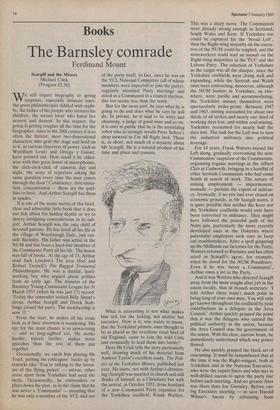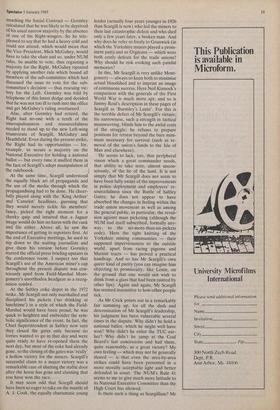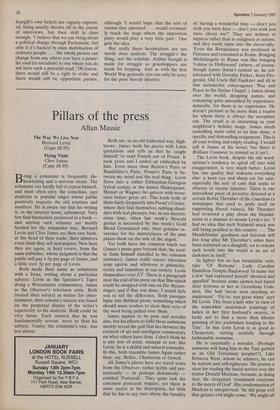Books
The Barnsley comrade
Ferdinand Mount
Scargill and the Miners Michael Crick (Penguin £2.50)
We still expect biography to spring surprises, especially intimate ones: the great philanthropist riddled with syphi- lis, the father of his people who tortures his children, the screen lover who hates her nearest and dearest. In this respect, the going is getting tougher all the time for the biographer, since in the 20th century it is so often the flattest, most two-dimensional characters who grab the stage and hold on to it, as various observers of power, such as Wyndham Lewis and Ortega y Gasset, have pointed out. How could it be other- wise with that great forest of microphones, the click-click-click of cameras day and night, the army of reporters asking the same question every time the man comes through the door? Consistency, determina- tion, concentration — these are the qual- ities to have. And Arthur Scargill has them in spades.
It is one of the many merits of this brief, clear and admirable little book that it does not fish about for hidden depths or try to descry intriguing contradictions in its sub- ject. Arthur Scargill was the only child of devoted parents. He has lived all his life in the village of Worsbrough Dale, just out- side Barnsley. His father was active in the NUM and has been a hard-line member of the Communist Party all his life. The house was full of books. At the age of 13, Arthur read Jack London's The Iron Heel and Robert Tressell's The Ragged Trousered Philanthropist. He was a dutiful, hard- working boy who argued about politics from an early age. The minutes of the Barnsley Young Communist League for 31 March 1955 (when he was just 17) record: 'Today the comrades visited Billy Smart's circus. Arthur Scargill and Derek Stub- bings joined the party. The membership is now 11.'
From the start, he makes all his rivals look as if their attention is wandering. His eye for the main chance is so unwavering — arid so long-sighted too. He works harder, travels further, makes more speeches than the rest of them put together.
Occasionally, we catch him playing Mr Toad, putting his colleagues' backs up by remarks like 'You're talking to the inven- tor of the flying picket' — untrue, other areas apart from Yorkshire had used the tactic. Occasionally, he embroiders or plays down the past, as in the claim that he was never a 'Communist' — meaning that he was only a member of the YCL and not of the party itself. In fact, since he was on the YCL National Committee (all of whose members were expected to join the party), regularly attended Party meetings and stood as a Communist in a council election, this too seems less than the truth.
But for the most part, he says what he is going to do and does what he says he will do. In private, he. is said to be witty and charming, a judge of good wine and so on; it is only in public that he is the unyielding robot who so strongly recalls Peter Sellers's shop steward in I'm All Right Jack. There is, in short, not much of a mystery about Mr Scargill. He is a natural product of his time and place and parents.
What is interesting is not what makes him tick but the ticking, not motive but narrative. How is it, one wants to know, that the Yorkshire pitmen, once thought to be as placid as the overdone roast beef of old England, came to join the wild Celts and eventually to lead them into battle?
Here Mr Crick tells the story particularly well, drawing much of his material from Andrew Taylor's excellent study, The Poli- tics of the Yorkshire Miners, published last year. He starts, not with Arthur's christen- ing (Scargill was married in church and still thinks of himself as a Christian) but with the arrival, in October 1953, from Scotland of a new Communist Party organiser for the Yorkshire coalfield, Frank Watters.
This was a sharp move. The Communists. were already strong enough in Scotland, South Wales and Kent. If Yorkshire too could be captured for the 'broad Left', then the Right-wing majority on the execu- tive of the NUM could be toppled, and the mineworkers could lead an assault on the Right-wing majorities in the TUC and the Labour Party. The selection of Yorkshire as the target was all the sharper, since the Yorkshire coalfields were doing well and expanding, while the Scottish and Welsh ones were contracting; moreover, although the NUM leaders in Yorkshire, as else- where, were pacific and accommodating, the Yorkshire miners themselves were spectacularly strike-prone. Between 1947 and 1963, mining accounted for about two thirds of all strikes and nearly one third of working days lost; and within coal-mining, Yorkshire accounted for nearly half the days lost. The task for the Left was to turn the industrial militancy into political leverage.
For 14 years, Frank Watters nursed the Left along, gradually overcoming the non- Communists' suspicion of the Communists, organising regular meetings in the Albert Club at Cudworth, bringing in a handful of other Scottish Communists who had come South in search of work. The nature of mining employment — impermanent, nomadic — permits the export of militan- cy. Ironically, if no pits had ever closed on economic grounds, as Mr Scargill wants, it is quite possible that neither the Kent nor the Yorkshire coalfields would ever have been converted to militancy. They might have followed the peaceful path of the Notts pits, particularly the more recently developed ones in the Dukeries where paternalist employers took care to keep out troublemakers. After a spell gingering up the Midlands car factories for the Party, Watters returned to Barnsley and has often acted as Scargill's agent, for example, when he stood for the NUM Presidency. Even if he was 'never a Communist', Arthur owes a lot to the Party.
And it was Watters who directed Scargill away from the most sought after job in the union locally, that of branch secretary: 'I told Arthur there wasn't much point in being king of your own men. You will only get known throughout the coalfield by your contributions as a delegate in the Area Council.' Arthur quickly grasped the point that it was the delegate who carried the political authority in the union, because the Area Council was the government of the union. With his clear, narrow brain, he immediately understood which way power flowed.
He also quickly grasped the black art of caucussing. It must be remembered that at the time it was the Right-wingers, both in Yorkshire and in the National Executive, who were the expert fixers and who met in well-drilled caucus to agree the party line before each meeting. And no greater fixer was there than Joe Gormley. Before one big Executive meeting — to save Harold Wilson's bacon by refraining from smashing the Social Contract — Gormley • calculated that he was likely to be deprived of his usual narrow majority by the absence of one of his Right-wingers. So he tele- phoned to say that he had a heavy cold and could not attend, which would mean that the Vice-President, Mick McGahey, would have to take the chair and so, under NUM rules, be unable to vote, thus regaining a majority for the Right. McGahey riposted by applying another rule which bound all members of the sub-committee which had discussed the issue to vote for the sub- committee's decision — thus rescuing vic- tory for the Left. Gormley was told by telephone of this latest dodge and decided that he was not too ill to rush into the office and get McGahey's ruling overturned.
Alas, after Gormley had retired, the Right had no-one with a tenth of the unscrupulousness and resourcefulness needed to stand up to the new Left-wing triumvirate of Scargill, McGahey and Heathfield. Even during the present strike, the Right had its opportunities — for, example, to secure a majority on the National Executive for holding a national ballot — but every time it muffed them in the face of Scargill's adept manipulation of the ruleb000k.
At the same time, Scargill understood the equally black art of propaganda and the use of the media through which the propagandising had to be done. He cheer- fully played along with the 'King Arthur' and 'Camelot' headlines, guessing that they would merely tickle his members' fancy, picked the right moment for a cheeky quip and intuited that a Jaguar image would do him no harm with the rank and file either. Above all, he saw the importance of getting to reporters first. At the end of Executive meetings, he used to nip down to the waiting journalists and give them his version before Gormley started the official press briefing upstairs in the conference room. I suspect too that Scargill's use of the American miner's cap throughout the present dispute was con- sciously aped from Field-Marshal Mont- gomery's unorthodox headgear as a recog- nition symbol.
At the Saltley coke depot in the 1972 strike, Mr Scargill not only marshalled and disciplined his pickets ('no drinking at lunchtime') in a style of which the Field- Marshal would have been proud; he was quick to heighten and embroider the sym- bolic significance of the event. In fact, the Chief Superintendent at Saltley now says they closed the gates only because no lorries wanted to go in that day and were quite ready to have re-opened them the next day., but most of the coke had already gone, so the closing of the gates was 'really' a hollow victory for the miners. Scargill's successful claim to a major victory was a remarkable case of shutting the stable door after the horse has gone and claiming that you have won the race.
It may seem odd that Scargill should have been so eager to take on the mantle of A. J. Cook, the equally charismatic young leader (actually four years younger in 1926 than Scargill is now) who led the miners to their last catastrophic defeat and who died only a few years later, a broken man. And why does he refer so freely to Grunwick (in which the Yorkshire miners played a prom- inent part) and to Orgreave — which were both costly defeats for the trade unions? Why should he risk evoking such painful memories?
In this, Mr Scargill is very unlike Mont- gomery — always so keen both to minimise actual bloodshed and to imprint an image of continuous success. Here Neil Kinnock's comparison with the generals of the First World War is much more apt; and so is Jimmy Reid's description in these pages of Scargill as 'Barnsley's Lenin'. For this is the terrible defect of Mr Scargill's virtues; his narrowness, such a strength in tactical manoeuvring, blinds him to the awful costs of the struggle; he refuses to prepare positions for retreat beyond the bare mini- mum necessary for survival (such as re- moval of the union's funds to the Isle of Man and elsewhere).
He seems to lack, too, that peripheral vision which a great commander needs, that ability to take note, almost uncon- sciously, of the lie of the land. It is not simply that Mr Scargill does not seem to have been fully aware of the improvements in police deployment and employers' re- sourcefulness since the Battle of Saltley Gates; he does not appear to have absorbed the changes in feeling within the trade union movement as well as among the general public, in particular, the revul- sion against mass picketing (although the NUM had itself subscribed, formally 'any- way, to the no-more-than-six-pickets code). Here the tight knitting of the Yorkshire mining communities — their supposed imperviousness to the outside world, apart from racing pigeons and Marxist tracts — has proved a practical handicap. And so has Mr Scargill's own queer kind of purity (you can imagine him objecting to promiscuity, like Lenin, on the ground that one would not wish to drink from a glass that had been tainted by other lips). Again and again, Mr Scargill has seemed insensitive to how other people tick.
As Mr Crick points out in a remarkably fair summing up, for all the dash and determination of Mr Scargill's leadership, his judgment has been vulnerable several times in the dispute. Why didn't he hold a national ballot, which he might well have won? Why didn't he enlist the TUC ear- lier? Why didn't he jump at the Coal Board's last concessions and hail them, quite reasonably, as a great victory? My own feeling — which may not be generally shared — is that .even the area-by-area strikes could have been presented in a more morally acceptable light and better defended in court. The NUM's Rule 41 seems to me to give much more latitude to its National Executive Committee than the High Court has allowed.
Is there such a thing as Scargillism? Mr
Scargill's own beliefs are vaguely express- ed, being usually thrown off in the course of interviews, but their drift is clear enough: 'I believe that we can bring about a political change through Parliament, but only if it's backed by mass mobilisation of ordinary people. . . the whole picture can change from one where you have a peace- ful road (to socialism) to one where you do not have such a peaceful road.' Of course, there would still be a right to strike and there would still be opposition parties, although 'I would hope that the sort of system that operated . . . would eventual- ly reach the stage where the opposition party would play a very little part.' One gets the idea.
But really these lucubrations are not worth close analysis. The struggle's the thing, not the solution. Arthur Scargill is made for struggle as grasshoppers are made for hopping. And as with the first World War generals, you can only be sorry for the poor bloody infantry.








































 Previous page
Previous page